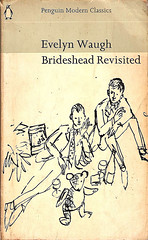Brideshead Revisited, I imagine, is one of those books you would read very differently depending on how you feel about the Catholic church.
To me, an atheist to my core, it is a book about nostalgia and a desperate, futile attempt to grasp what is gone. This reading makes sense to me, but I know those who take the author's Catholicism into account read parts of it (especially the ending, I suppose) in a more positive, although I hesitate to say "upbeat", way. Waugh claims it is about ``the operations of divine grace on a group of closely connected characters''. I find it is a book about having experienced happiness and a futile attempt to later grasp at any reminder of that happiness available.
The fact that this book accommodates two diametrically opposed impressions is part of the reason why it is so good. It never attempts to hammer home a point; it lays itself open to the reader in a way too few books do.
I would not want you to get the wrong impression from what I have just said. The book is delightful. Especially the description of the early days at Oxford and Brideshead. I suppose it goes somewhat with the territory. A novel about nostalgia could do worse than make its reader nostalgic for the happy past dominating the life of its central character.
It is the story of Charles Ryder. The subtitle of ``The Sacred & Profane Memories of Captain Charles Ryder'' is not appended to my edition. It may be one of those things that Waugh excised in his revision. Charles Ryder goes to Oxford, meets Sebastian and his dandified set of young men (and Aloysius, his teddy bear), drinks wine, is happy; and is then slowly drawn into the family circle and the unpleasant manipulative currents within it. And then he grows up. And life becomes a little more grey, a little more mundane. Gay abandon becomes dipsomania, and it is all framed by the position of the England of the Second World War.
My edition is Waugh's revised 1959 version of the book. In a preface he explains the changes made, saying that
It was a bleak period of present privation and threatening disaster -- the period of soy beans and Basic English -- and in consequence the book is infused with a kind of gluttony, for food and wine, for the splendours of the recent past, and for rhetorical and ornamental language, which now with a full stomach I find distasteful.I can only conclude that I had better get my hands on the original 1945 version of the book. As a student, living on no money, and surrounded by the current use of language, I cannot help but feel something approaching that desire for fantasies of wonderful food and wine and delicious ornamental language which I imagine Waugh felt towards the end of the war. The dandified attention to beauty and the rejection of the values dictated by the world of Serious people appeals to me. And my feelings as it disappears into a steadily more dejected, flat and unappealing present can be imagined.
But it is that depressing second half which makes this something more than delightful period candy. It turns it into a book about something real, about loss of something lovely and bright, and the attempt to hang onto it -- rather prefigured by Sebastian and Aloysius, I think.


Comments